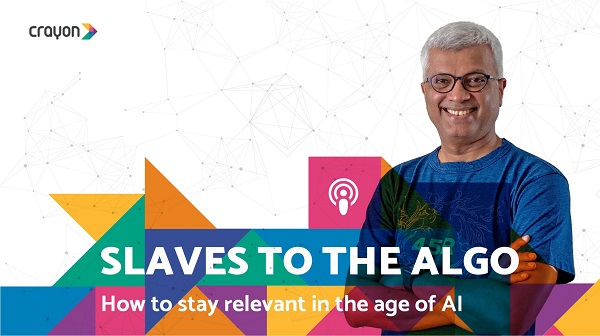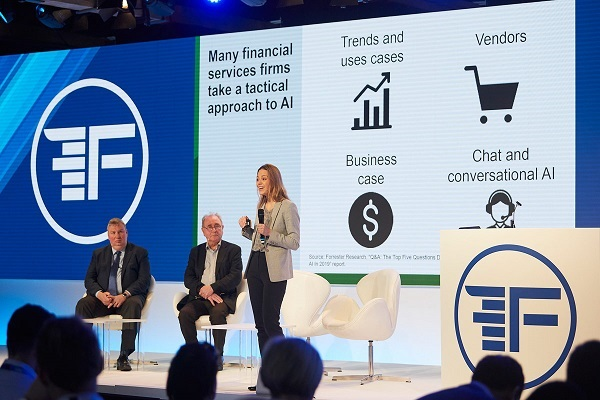We recently interviewed Pankaj Rai, a well-known expert in analytics and banking and is currently the Senior Vice President Strategy at Wells Fargo. The former Analytics Director at Dell International Services, Pankaj shared his views on some of the hot topics in the financial & banking sector right now – digital transformation, innovation in fintech, new regulations, and blockchain to name a few.
Read the complete interview below:

What does your day typically look like at Wells Fargo? How do you start and end your day?
(Laughs) My days are quite straightforward. I get up 6:30 am in the morning, five days a week (I get up earlier on weekends for a run). At 7:45 am, I am in my car, going to work and 7:45 to 8:30 (which is my travel time) is spent talking to someone – this could be old friends or people who have recently connected with me. So, my morning starts with talking to people. Then 8:30 am to 6:30 pm is typically my work time which is filled with meetings, phone calls, brainstorming sessions and thinking about what to do, how to do it and getting things done. Late evenings are a mix of US calls and family time.
Financial institutions worldwide are exploring new technologies and business models that can help them compete in today’s digital age. From robot advisors, open APIs, chatbots, AI and blockchain technology, the financial industry is undergoing a radical transformation. Can you tell us the top innovations and trends to watch out in 2019?
First of all, let me talk a bit about the digital transformation that you mention. Clearly, technology is entering every business – whether it is automobile or finance or any other industry and disrupting/transforming them.
The future of banking will move away from the physical branch; away even from a PC-based world to a user-centric/mobile-centric one. This makes it all the more important for organizations, big and small, to focus on user-centric design. Design thinking will become a skill set that everyone will have to pick up – whether it’s the process team developing the workflow, the UI/UX guys building the interface or the engineer guys building the information infrastructure.
In developed markets, including ones like India, aggregators that help you manage your expenses (MoneyView), your credit cards (CRED), your financial health will start becoming ubiquitous. We will also see the global expansion of some of India’s world-class app functionalities/features – we all know how YouTube Offline Download was started as a feature for India’s price-sensitive data downloader. Similarly, Uber customized their app for added safety of women passengers, a feature it is now rolling out in other countries. In fact, the Indian digital wallet PayTM is doing well in Canada and is one of the top finance/wallet apps there, because that market has never seen the concept of cashbacks until now.
So non-Banking industry players, whether it is Paytm, Apple Pay or similar players, are the ones that are going after new business opportunities in the financial services space and are impacting banks.
Today, everybody understands the power of data analytics and machine learning capabilities, in understanding the customer’s needs and building a holistic system to enable personalized and relevant interactions with the customers. However, few banks have embraced the holistic approach. Many traditional banks still operate hard-to-transform legacy systems. What are the key pain points and the reasons why banks still struggle with digital transformation?
Banking, at the core of it, is still a highly risk-averse industry. It is heavily regulated in all countries. And in the case of international banks, regulations span multiple countries. Dealing with regulation requires a lot of oversight, involvement, and effort. And the risk of going wrong is too high – over time, this leads to a tendency of ‘if-it-not-broken-do-not-try-to-fix-it’. I believe it’s a cultural thing that’s unique to banks and common across the world. Which is why you don’t see a lot of innovation coming from the banks themselves. Even today, there are banks out there that have their systems based on mainframe technology from the 1970s – those machines are not manufactured anymore, and the hardware can only be repaired by a handful of professionals. The world has moved on long ago from the languages that were used to code those programs. But the situation still remains. There are still banks out there that are so risk-averse that they will keep trying to continue using old tech that works, instead of proactively moving to the latest cutting-edge tech.
When we talk about customer-centricity being the future, the data arrives from the customer’s standpoint. Now, what is happening today is that most of the innovative technology, I would say is connected to big data and analytics. However, data is bit of a problem for most companies, let alone banks. And the reasons are several. One of them is that when the IT systems were designed for most companies including banks, I don’t think they really gave a thought to the fact that data will become such an important element of the IT system. You know you will have to make sure that there is a data center, and capabilities for data manipulation and all of those things. So, the IT systems did not anticipate the big data revolution. And therefore, they did not design it in a certain way which it is adaptable to better data manipulation. So that is the technology side of it.
The other side of it is privacy regulations. I mean banks are much more careful about customer data. But the price of regulations that are now coming in effect, like the GDPR in Europe, is about the access and control over data. Essentially, what’s happening is that regulators and governing organizations are saying that the data is owned by individual companies. And they should exercise control so that no one can use the data for a purpose that has been not sanctioned by the data owners. So that is a big deal. Because, if you look at most data users today – from companies like Google or Amazon, they are personalizing their services by using all the data. But they don’t always take all the necessary permissions to do so. And as consumers, you and I have technically not given our permission to use that data in whatever way. We don’t realize it because we are getting a lot of great deals and no ‘real’ harm is coming our way. There are also some of us who do know, but don’t mind and don’t care. However, some of the companies were heavily fined in Europe as that continent is leading in data privacy regulation. So, more and more regulations are coming into effect which leans towards the source of the data, and not letting the custodians decide how it can be used.
For example, in certain banking cases I, as a customer in Europe, can say that you can use my data only for ad campaigns from your organization. Or only for analysis, without sending me anything. And I don’t want any AI model to make a business decision for myself. So, you have to get a human operator, to look at my data and tell me the relevant insights. I can choose to do that. Now, by doing that I will suffer because I may not get certain benefits or services. Simply because I chose to opt out. The regulators are giving users that authority to make a choice. So, I think the choice of using the data from the consumer is a very big deal. And companies did not anticipate how big data would be used and regulated. A lot of consumers started selecting how their data would be used. And it slowly becomes a biased sample. Therefore, the analysis that you do on that data may or may not be complete or accurate.
So, I am saying that a lot of unanticipated things are happening in the data world. Thanks to innovators becoming more active and customers becoming more knowledgeable. The way how big data analysis and personalization will evolve is itself to be seen.
I, for example, can see the personalized social media adverts on Facebook. But if I am given a choice, I will prefer not seeing them. Because for me, I actually don’t need this level of personalization. I know what I need, and I know how to make that choice. I don’t need a company telling me what I think I need or not. So, I don’t need targeted marketing. I am saying from my own perspective. So, it’s a relief when data privacy regulations are passed. I think – okay, my data is mine. And I don’t need to worry about it leaking to the wrong hands. You can do this with any model. This is how I think it should be. And lately, more and more people have started thinking along similar lines. Some AI models and algorithms are thought to be very, very useful. But, in reality, they might not be.
The other point to note is also more on the regulatory side. And I think it will become a part of how most industries will function very soon. It is the concept of explainable AI. Today, many AI models, chatbots and machine learning algorithms are based on mathematical models. It shows an outcome, but one does not always know how or why those outcomes are being formed. This is mainly because of the large amounts of data being processed. Either way, the models come up with patterns that can analyze past events and predict future ones. But, at least in the case of the banking industry, it absolutely necessary that one is able to ascertain why a particular result or decision occurs. For example, if a loan is denied, then the decision-maker must be able to explain that the decision was not based on bias such as his designation, his gender, race or other traits. You need to be able to explain this to auditors. Now that explanation is also something new which is coming about, and you cannot explain some of those things.
So, as I said before, there are a lot of new developments that are happening in the finance industry. And I think they will actually curtail the use of big data and AI. On the one hand, we are possessing the power of data. And more and more data are being manufactured every day at an extremely fast pace. On the other hand, regulations and consumer awareness are going in a different direction – saying don’t want you to use the data and if you use it, I need an explanation. So, you cannot simply use a black box model. Because these models are sometimes quite counter-intuitive.
It is a very interesting time. There are two intercepting things happening in reverse directions. And it remains to see how they will play out. The only country where I think they are all sort of aligned is China where there are no particular data regulations. Everywhere else in the developed and democratic world, things are happening in a completely different way.
According to McKinsey, origination and sales generate 65% of global banking profits, totaling about $1,152 billion in 2016. These profit drivers are threatened by increased competition from digital-only challenger banks and tech giants like Google and Amazon. Banks need to act urgently to get ahead in the digital sales game, or they risk becoming mere commodity providers with very thin margins in just a few years. What’s your take on this? How do you think banks should respond?
If you look at how banks make money, there are two ways. One is asset-based lending in which you have the money and you give out loans. And the other one is that you perform a service with no risk of your asset. You are not putting money aside for the service. Not to mention that banks have a regulatory necessity for what kind of equity they should keep. And the equity is based on the risk of the assets they have. This is the fundamental foundation of how a bank works.
If you look at the fintech upstarts, none of them are operating in the space with the highest amount of regulation – customer deposits. They operate in areas where their responsibilities are much lower, where they are not directly holding the customer’s money, and where there isn’t necessarily too much of regulation.
Now, if you look at the system where you are not putting any assets or money aside, those are the areas where it is very easy to be disrupted. Because a new player in the industry or a technology company does need to have a lot of money or own their own assets to run a business like this. Obviously, there is a connection between the two. One area is payments and another area are money transfer. So that is where the latest Fintech innovation is aimed. It has a number of new players have come in to play which are eating into the bank’s profitability. Apart from these two, there are other areas like raising funds and investments. Before there were investment banks who would say I will raise money for you and I will charge you a fee. Now there are digital crowd-sourcing platforms where I can actually go to and raise funds on my own, and thereby rendering the middleman obsolete. If you look at all the money-making schemes and payment gateways, fundraising platforms, there are now robot advisors for any individual looking for financial advice. Simply plug in financial data into an algorithm, and they can advise him accordingly.
Now banks have also entered this field of fintech. It’s not as if banks are sitting idle. Banks are self-innovating. They will also need to partner with surrounding technology eco-systems. Because they cannot remain isolated and expect similar outcomes as before. The future game-plan now is to build an eco-system in almost every industry, where you can to collaborate across verticals. So, I think given that the banks have multiple points of relations with their customers, they are the one-stop-shop for custom offers from the millions of travel, hospitality, dining, retail and healthcare merchants. Many customers would rather deal with one pair merchant for a particular product/service vs 15 different pairs of vendors.
For example, while you go to a grocery shop and buy every vegetable. You may not want to go to different grocery stores to buy different things, because it is too much of an effort. I think it’s the same way for banks. They are offering very specialized offers to their customers. Try looking at it from the grocery store analogy. Many customers would say that I am not just shopping for vegetables or clothes – I’d rather have the entire package. Some of those in Fintech will partner with departmental stores or malls. Because they are superstores where everything is available.
Given that there will be regulatory sanctions, these partnerships would be able to do several other things that simply Fintech cannot do, as you can imagine. The Fintech field is not regulated. They are unable to do many things these are tasks/transactions that need to be conducted under regulation.
So, I think the future will belong to collaboration. Banks need to learn how to collaborate, which I think has given rise to a whole revolution of related open APIs. In a world where you have to collaborate, APIs are a good mechanism to enable it. So, I think people who are able to creatively find collaboration and enable it can split the income between two collaborators. But since banks have usually had a closed-walled approach to outside parties, banks will need to figure out how to compartmentalize their fintech attempts by creating some mechanism to separate the efforts from the primary bank and its culture.
Apart from that, banks have to face reality – all human endeavor moves towards where the rewards are higher. If banks have been enjoying high-profit margins, it is only a matter of time before other players enter to take a piece of the pie. Technology has been the greatest leveler we’ve seen in the last 50 years, so it’s no surprise that Google and Amazon, who are both digital-born world leaders are the ones that end up driving that charge.
My next question is about blockchain technology. It is currently the hottest innovation in banking. The technology, which underpins cryptocurrencies such as bitcoin, was initially treated with skepticism by banks. However, this is changing dramatically. What’s your take on this?
You might have heard about the philosophical argument for blockchain. How it is based on the concept of establishing trust without a central authority. And that concept can currently be extended to anything related property or finance. Even commerce. Therefore, the context of blockchain is a good one. Collaborators disintermediate the central authority. And the benefits of this intermediation are few but valuable. Because the intermediate authority sometimes extracts rent, which you can get away from. You don’t have to pay any rent to the central authority. And secondly, sometimes the central authority can become too powerful and may not act on the best interest of the all the consequents. Therefore, the benefit of the blockchain technology is that a group of people can self-regulate and determine what is good for them. (They don’t have to pay any rent.)
Contextually, blockchain is a good business case and it should be utilized. Depending on the context of the activity in which this should be applied, it is yet to be seen how it plays out because as you know business is only one element of it. Economic, political and there are several other variables that play out when you commercialize any technology. Just take bitcoin for that matter. It is a popular use case of blockchain technology. In my personal opinion, currency is an important political and economic weapon that countries use to control. And also deal with other countries. The EU and all its trade activities are very, very critical issues of national importance.
So, I don’t think that any country will allow Bitcoin which is a disintermediate way of managing their currencies because the currency will have a very impact on the economy and the politics of the country. Therefore, it will always be been regulated. The moment you start to regulate it, it defeats its very purpose. Because the main purpose or the theory of blockchain was that there are no central authorities to dictate regulations. So, the current use case of blockchain is a difficult one. Maybe there are other creative ways of doing it, but it appears for it to become a meaningful reality as it is supposed to be in the past as an asset class people can trade and do certain things, which is unlikely to become mainstream. That’s my personal view.
However, on the other hand, if we talk about many of the other use cases like the peer group come together and validate some of their activities, which are not so national, economic or political importance, they are purely in the way of reducing friction in our transactions with each other and all of that. Those kinds of use cases I think will make our system far more efficient and will allow many more things to happen which is not happening right now because the technology is not there. So, I think every new technology, while it sorts of eliminates certain old ways of doing things, also creates new opportunity. So many times, people get worried about new technology, they think that it will kill seven years scheme and we will not be profitable. We have seen this in the past and it definitely happened, but many new opportunities have come, and our human ingenuity and innovation have been there. Newer opportunity for people to create value and therefore make money. That’s my personal view on the blockchain.
If we look at cryptocurrency, 2018 has been a year of expectation reset for the community. No longer is crypto being looked at as a replacement of fiat, but as playing a complementary role. The good thing is that the bear market has dried out a lot of the stupid money that was being tapped by ICOs, many of which were nothing more than pipe dreams. The good solid projects have a lot of work happening behind the scenes, and 2019 should throw up some real-world use cases that will see better adoption. There are projects out there which enable you to convert any crypto to any other crypto in real-time and on-the-fly, so if you’re trying to make a payment using Ethereum but the merchant accepts only Bitcoin, that transaction can still happen. Similarly, people are developing web-based protocols that work inside your browser, so if you want to read an article, or access content behind a paywall for 2 hours, or remove annoying pop-up ads, all of this will be possible through some upcoming protocols & integration. The rise of the prices of cryptocurrency had led to a spike in transaction charges, so much so that it became unfeasible to have micro-transactions (you wouldn’t pay $20 in transaction fees to spend $3 on your coffee). However, with the upcoming abilities to use off-chain transactions, micro-transactions will benefit the most.
My next question was about GDPR and new regulators, but you have already covered a lot about them. So, I am not going to ask that. I would like to ask what would be the future of the financial industry in the next five years?
Actually, five years is a very short time in the financial industry. Like I said, even if there are large companies and regulations, things change very slowly than we would like them to be or what we would imagine them to be. But still, I do think that if I were to look forward five years, the answer remains; all those financial companies remain. So, I don’t think substantially anything will change. Fintech will remain. What I image from five years from now is we will have better and new business models of the ecosystem play which today does not exist.
Today my bank has all the information about me. If I have to deal with Fintech, I have to establish a special relationship with them, do everything separately. If you look at the PSD regulations that have come in Europe, all the future regulations and all of those things – that is my personal observation – is that Europe drives away. The Europeans are more thoughtful about how the regulations should evolve and the Americans are forced to follow that. So that is my personal view. PSD regulations which are asking all the banks to make all the data open for the customers.
So, my worldview five years from now is very API type of a system where the ecosystem helps to deal with things vs the bilateral relationship that we have today with banks and Fintech. At that point in time, in some cases, I might be dealing with some Fintech who has access to my bank data and in some other cases I might be dealing with my bank itself for certain service and they internally will have arrangements to sort of distribute the fees, because many of these things at the backend – they might be sort of helping each other with certain services. And I might also get a fee. So, I would say that it would become a big ecosystem place not just in Fintech, but I would think that the retailers would also start becoming an important part in this. Because if you look at the customers, at the end of the day they’d love to spend money on retail and many other places. And I think those retail companies will find a way to getting into payments. We still have to figure out a reason to collaborate with them to help their requirements of the customers to send the money and also get the financing. So, I imagine it as a dynamic ecosystem powered by API.
We also need to recognize GDPR and similar regulations for what they are – they are a reaction to the ever-increasing reach of digital-only companies when it comes to acquisition, possession, and usage of user-related data, as deemed fit by those companies. The EU is leading the charge in the pushback against such companies, by sending a message that ‘with increased data, comes increased responsibility’. At the end of the day, GDPR is a move in the right direction, as it’s right for the customers. And the organizations that are smart will realize that it is in their best interests to align to what is right for the customers. And if they don’t, then someone else will. The EU, with GDPR, is the equivalent of the referee entering the field of a free-for-all soccer match in which the team of companies had the upper hand and were completely dominating the team of customers.
That being said, there will be some countries where the risk of localization might be higher due to back-door channels/requests that can come in from governments in power. Organizations will need to be careful in how they navigate these risks because customers will be unforgiving and harsh on organizations more than governments if their trust/security gets breached. In situations like these, it is important and admirable to do what Apple has done – put their customer’s priorities front-and-center, fight back on government overreach that requires backdoor access to user data, and refuse to dumb down the level of encryption/security to cater to governmental demands (irrespective of the justification).






















